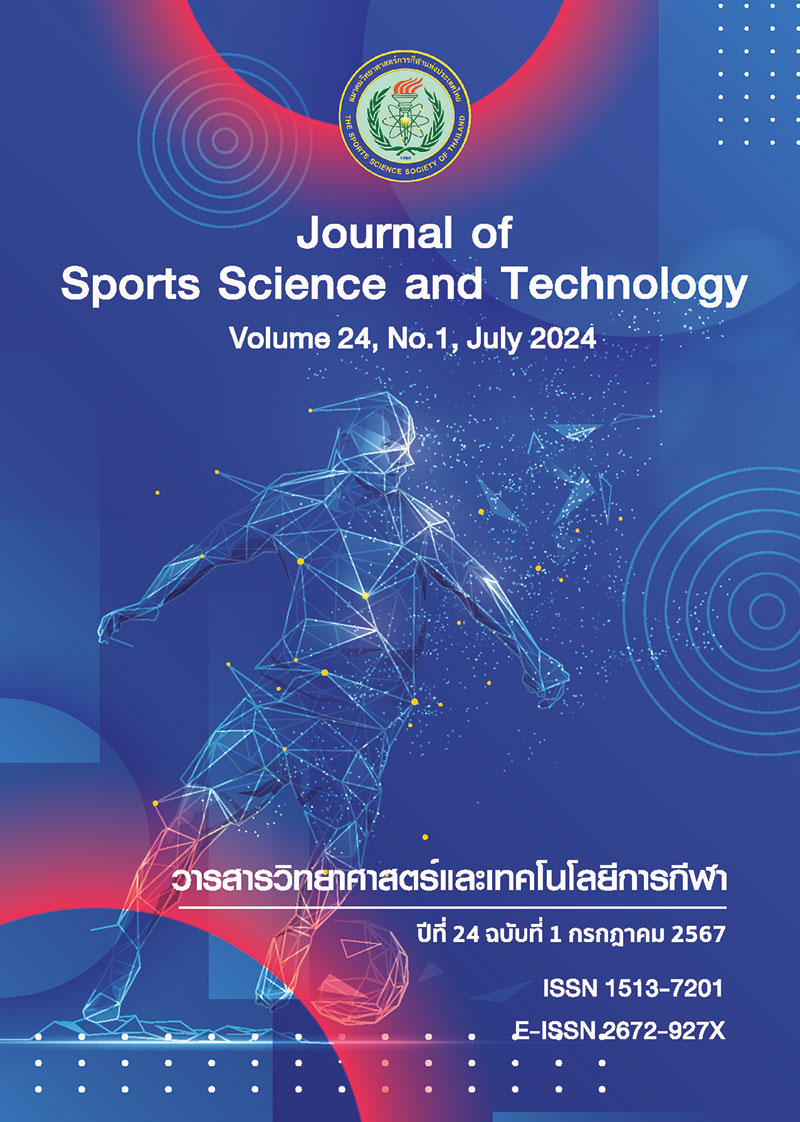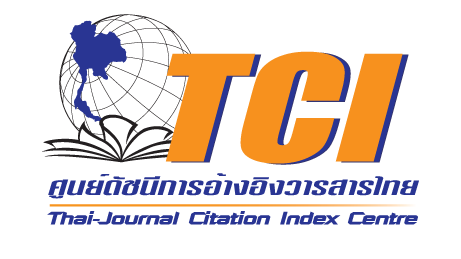CONFIRMATORY FACTOR ANALYSIS OF PSYCHOLOGICAL CHARACTERISTICS OF ELITE FUTSAL ATHLETES IN TRAINING QUESTIONNAIRE
DOI:
https://doi.org/10.14456/jsst.2024.6Keywords:
Elite Futsal Athletes, Psychological Factors, Psychological Strategies, Psychological QuestionnaireAbstract
The purpose of this study was to validate psychological characteristics of elite futsal athletes in training questionnaire. The subjects were 303 professional futsal athletes who participated in the Thailand Futsal League
in 2021, aged an average of 24.35, with 4.62 years of professional athletic experience. Psychological characteristics of subjects were calibrated in the training questionnaire by 49 items, comprising eight psychological factors and seven psychological strategies. The questionnaire was completed by subjects in 20 to 25 minutes. Result were that psychological characteristics consisted of eight psychological factors:confidence and freedom from anxiety (CA); motivation (MT); remaining in the present (SP); intent, dedication and commitment (IDC); mental toughness (MN); self-esteem (SE); ball playing intelligence (IP); and unity (UT) and seven psychological strategies: positive self-talk (PT); relaxation (RL); receiving encouragement (GE); sports performance development (PD); harmoniousness with teammates (CH); cherishing models, motto, and vision (MMD); and self-assertivenessas well as goal management (SGM). Confirmatory factor analysis revealed that the model was adequate (reasonable fit) (x2/df = 2.83, GFI 0.70, AGFI = 0.67, NNFI = 0.94, CFI= 0.95,RMSEA = 0.078) and a Cronbach’s alpha coefficient was 0.94, indicating that the questionnaire could be used for assessment of psychological characteristics of elite futsal athletes in training.
(Journal of Sports Science and Technology 2024; 24(1):65-81)
(Received: 7 October 2023, Revised: 26 June 2024, Accepted: 1 July 2024)
Corresponding Author: Wichai YEEMIN
Faculty of Allied Health Sciences, Thammasat University,
Klong Nueng, Klong Luang, Pathumthani, 12120, THAILAND
E-mail: wichai.yee@allied.tu.ac.th
References
Yeemin W. The psychological characteristics of futsal players: A construction of psychological
characteristics measure and profile of elite players. Bangkok: Kasetsart University; 2016.
Department of Physical Education. T-Certificate futsal coaching guide. Bangkok: WVO officer of
printing mill: The war veterans organization of Thailand under royal patronage of his majesty the king; 2012.
Yeemin W, Dias CS, Fonseca AM. A systematic review of psychological studies applied to futsal.
J Hum Kinet. 2016;50(1):247-57.
Weinberg RS, Gould D. Foundations of sport and exercise psychology. Seventh ed. Champaign, IL:
Human kinetics; 2019.
Kemarat S. Basic of sport psychology: A practical guide. Second ed. Pathum Thani: Thammasat
University Press; 2020.
Bois JE, Sarrazin PG, Southon J, Boiché JC. Psychological characteristics and their relation to
performance in professional golfers. Sport Psychol. 2009;23(2):252-70.
Waples SB. Psychological characteristics of elite and non-elite-level gymnasts. USA: Texas A&M
University; 2003.
Orlick T, Partington J. Mental links to excellence. Sport Psychol. 1988;2(2):105-30.
Khalil E. Profile of the psychological characteristics of the shortdistance swimmers of the beginners.
World J. Sport Sci. 2011;4(3):248-51.
Gould D, Maynard I. Psychological preparation for the Olympic Games. J Sports Sci.
;27(13):1393-408.
Dimyati. Psychological characteristic of athletes at the student education and training. Anima
Indonesian Psychol J. 2010;25(3):172-80.
Omar-Fauzee MS, Daud W, Abdullah R, Rashid S. The effectiveness of imagery and coping strategies
in sport performance. Eur J Soc Sci. 2009;9(1):97-108.
Sepasi H, Nourbakhsh P, Zarasvand K, Javadi A. The relationships between sporting imagery, self
confidence, and body mass index with sporting success in elite futsal athletes. Ann Biol Res. 2012;3(11):5293-
Bai N, Sheikh M, Rad LS, Anzehaie ZH. The relationship between coaching behaviors and competitive
anxiety in Golestan province futsal super league players. Euro J of Exp Bio. 2013;3(2):383-6.
Mottaghi M, Atarodi A, Rohani Z. The relationship between coaches’ and athletes’ competitive anxiety,
and their performance. Iran. J Psychiatry Behav Sci. 2013;7(2):68.
Yeemin W, Kemarat S, Theanthong A. Psychological factors and startegies of elite futsal athletes in
training: classified by palying position. J Sports Sci Technol. 2018;18(1):59-67.
Sakulsriprasert C. Confirmatory factor analysis. Th J Cli Psy. 2013;44(1):1-16.
Yamane T. Statistics: An introductory analysis. Third ed. New York: Harper and Row; 1973.
Wiratchai N. LISREL model: Statistical analysis for research. Third ed. Bangkok: Chulalongkorn
University Press; 1999.
Hair J, Blak WC, Barbin BJ, Anderson RE,Tatham RL. Multivariate data analysis. New Jersey: Prentice
Hall, Upper Saddle River; 2010.
Tabachnick BG, Fidell LS. Using multivariate statistics. Sixth ed. Boston: Pearson Education; 2013.
Jöreskog KG, Sörbom D. LISREL for windows [computer software]. Lincolnwood, IL: Scientific Software
International; 2005.
Cronbach LJ. Coefficient alpha and the internal structure of tests. Psychometrika. 1951;16(3):297-334.
Nunnally JC. Psychometric theory. Second ed. New York: McGraw-Hill; 1978.
West SG, Finch JF, Curran PJ. Structural equation models with nonnormal variables: Problems and
remedies. In: Hoyle RH, editor. Structural equation modeling: Concepts, issues, and applications. Thousand
Oaks, CA, US: Sage Publications; 1995. p. 56-75.
Kelloway EK. Using LISREL for structural equation modeling: A researcher's guide. Thousond Oaks,
California: Sage Publication; 1998.
Siguaw JA, Diamantopoulos A. Introducing LISREL: A guide for the uninitiated. London: Sage
Publication; 2000.
Kemarat S, Theanthong A, Vongjaturapat N. Development and validation of a Thai version of the
athletics coping skills inventory. J Sci Sport Exerc. 2014;11(1):7-20.
Pan-u thai S, Vongjaturapat N. The development of sources of sport confidence in Thai college athletes.
J Exer Sport Sci. 2009;6(1):82-97







